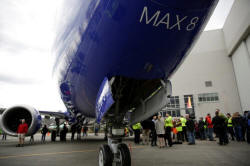Jet weight puzzle to determine China tariff impact on
Boeing
 Send a link to a friend
Send a link to a friend
 [April 05, 2018]
By Jamie Freed and Brenda Goh [April 05, 2018]
By Jamie Freed and Brenda Goh
SINGAPORE/SHANGHAI (Reuters) - China on
Wednesday announced plans to place a 25 percent tariff on certain U.S.
aircraft, in a move expected to affect some older Boeing Co <BA.N>
narrowbody models, according to documents from China's Ministry of
Commerce and the U.S. manufacturer.
But although several analysts said China had spared the newer 737 MAX -
key to future Boeing profits - the impact remained uncertain because of
a lack of detail in the announcement and the fact that not all airplane
characteristics are published.
Boeing shares fell as much as 6 percent after China hit back at U.S.
tariffs with the announcement of duties on key U.S. imports including
soybeans, cars, beef and chemicals, as well as planes.
These include aircraft with an "empty weight" of between 15,000 kg and
45,000 kg, or 15 to 45 tonnes.
Depending on how "empty weight" is defined, this leaves a question mark
over the fate of Boeing's new big-selling 737 MAX 8 jet - though the
larger MAX 9 and MAX 10 could be spared.
The stakes are high. The United States exported $15 billion of aircraft
to China in 2016, ranking equally with agricultural products like
soybeans as the biggest category of goods.

Several definitions of "empty weight" are used in the aircraft industry
and the ministry document gave no explanation.
Two industry experts said the rules most likely refer to the
"manufacturer's empty weight," or the core aircraft structure.
But manufacturers are usually shy about publishing this number because
of its commercial sensitivity, while they do give estimates for the
slightly higher "operating empty weight," which includes airline crew
and some equipment, but not fuel.
Yet even this number can vary according to an airline's specific
requirements, so it is seen as a guideline.
Whatever category is used, the range appears comfortably to include the
current-generation 737 narrowbody aircraft, which is in the midst of
being replaced by the newer 737 MAX.
737 MAX 8 IMPACT UNCLEAR
Boeing documents available online list the "operating empty weight" (OEW)
of the 737-700, 737-800 and 737-900 well within the tariff zone at 37.6
to 42.9 tonnes.
The "manufacturer's empty weight" (MEW) would typically be about 1-1.5
tonnes lower, two airplane appraisal experts said.
In contrast, the newer 737 MAX 8 is heavier than its predecessor, with
an operating empty weight of 45,070 kg, according to a Boeing document
published in August 2017.

Depending on how rules are applied, this leaves it hovering close to the
tariff border line and potentially still exposed to sanctions if the
more conservative "manufacturer" scale is used.
[to top of second column] |

Boeing employees are pictured in front of a 737 MAX 8 produced for
Southwest Airlines as Boeing celebrates the 10,000th 737 to come off
the production line in Renton, Washington, U.S., March 13, 2018.
REUTERS/Jason Redmond/File Photo

"I would expect a non-variable weight (MEW) to be used as the benchmark, as OEW
will vary from operator to operator," said Stuart Hatcher, chief operating
officer of UK-based advisory firm IBA, adding this would pull the jet below 45
tonnes.
Even if the more generous OEW weight format were used, not all 737 MAX 8s might
escape as some use lighter layouts. "A 70kg drop is pretty easy once you get
into the realms of low-cost carriers or standard single-class operations,"
Hatcher added.
Boeing said in a statement that while the United States and China have both
outlined positions that could harm the global aerospace industry, nothing
drastic has happened yet.
"We will continue in our own efforts to proactively engage both governments and
build on the recent assurances by U.S. and Chinese leaders that productive talks
are ongoing," it said.
Chinese airlines have been on a buying spree from Boeing and rival Airbus <AIR.PA>
as air travel grows.
Boeing and China's Commercial Aircraft Corp of China (COMAC) are expected to
open a 737 completion center in the coastal city of Zhoushan to install
interiors and paint liveries this year.
The bulk of published 737 orders from Chinese that have not yet been delivered
are for the newer MAX version.
However, China Southern Airlines <600029.SS>, Ruili Airlines and Okay Airways
each have two 737-800s on order and Xiamen Airlines has four more, according to
the Boeing order book.

Asked if the airline's plane buying plans could shift away from Boeing, China
Eastern Airlines Corp <600115.SS> Chief Executive Ma Xulun said on Wednesday
"it's too early to say, we will keep an eye on the situation of the China-U.S.
trade war."
Apart from some Boeing jets, the Gulfstream G650, a large corporate jet
manufactured by General Dynamics Corp <GD.N>, also falls into the weight range
targeted for tariffs.
Gulfstream declined to comment.
(Reporting by Jamie Freed in SINGAPORE and Brenda Goh in SHANGHAI; additional
reporting by Tim Hepher in PARIS, Alwyn Scott in NEW YORK; Writing by Jamie
Freed and Tim Hepher; Editing by Mark Potter, Susan Fenton and Tom Brown)
[© 2018 Thomson Reuters. All rights
reserved.] Copyright 2018 Reuters. All rights reserved. This material may not be published,
broadcast, rewritten or redistributed.
Thompson Reuters is solely responsible for this content. |